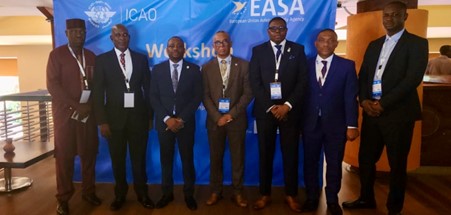Aviation experts at a regional workshop in Uganda have raised alarms over fragmented oversight structures across Africa’s airspace, warning that the continent’s aviation safety progress could stall without deeper cooperation among oversight bodies.
At the RSOOs-RAIO Validation workshop in Kampala, stakeholders stressed the urgent need for stronger collaboration between Regional Safety Oversight Organizations (RSOOs) and Regional Accident and Incident Investigation Organizations (RAIOs).
Participants agreed that fragmented systems and underinvestment in these entities continue to hamper efforts to ensure air transport safety across Africa.
Farid Zizu, a representative of France Aviation Civil Services (FACS), said trust, transparency, and well-defined value-added activities must underpin regional aviation oversight. In a paper titled “AFI RSOO: Creating Added Value to Member States,” he argued that RSOOs must demonstrate measurable benefits to member states, or risk losing relevance.
He said cooperation is not just desirable but fundamental. “Only active collaboration can create the kind of added value that makes regional oversight effective and sustainable,” Mr. Zizu said. He called for practical initiatives such as joint audits, cooperative safety oversight, and joint inspections to help national civil aviation authorities manage their oversight responsibilities more efficiently.
The challenge, he noted, is convincing states to invest in oversight structures they perceive as distant or redundant. But if member states see credible outcomes, Mr. Zizu believes confidence in RSOOs will grow.
Colonel Lawrence Jarra, Commissioner of Gambia’s Accident Investigation Board, highlighted how limited the continent’s capacity for accident investigation remains. Africa currently operates just one fully functional RAIO — the Banjul Accord Group Accident Investigation Agency (BAGAIA) — and even that agency faces challenges linked to resource constraints and lack of uniform support across the region.
Jarra warned that without broader investment in RAIOs, the continent may struggle to deliver timely safety recommendations, which are vital for preventing recurring accidents and incidents. “We cannot allow fragmented systems to hold us back,” he said, noting that comprehensive regional frameworks are essential for safe airspace management.
The Kampala workshop brought together senior representatives from several African aviation authorities, including John M.K. Wumborti, Commissioner of Ghana’s Aircraft Accident and Incident Investigation and Prevention Bureau. Ghana’s involvement reaffirmed its ongoing push for stronger continental cooperation in both accident investigations and safety oversight.
Throughout the sessions, delegates agreed that aviation safety governance in Africa needs more than financial resources. What is required, they said, is a renewed commitment to transparency, regional solidarity, and operational accountability.
Mr. Zizu reiterated that empowering RSOOs could also indirectly strengthen RAIOs. He argued that aligned strategies would minimize incident backlogs, eliminate duplicated efforts, and ensure harmonized enforcement of safety regulations across borders.
The workshop concluded with a consensus that while progress has been made, particularly with frameworks like BAGAIA, Africa must accelerate efforts to build integrated safety oversight and investigation systems. Failure to do so could threaten the rapid growth and competitiveness of the continent’s aviation sector.
The Kampala gathering marks a crucial step toward that goal. By bringing together voices from across the continent, it set the groundwork for a more unified, resilient, and safety-conscious air transport industry.










